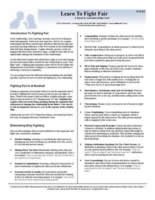All Couples Should Learn To FIght Fair. Here's How
Check out our mini-guide on how to fight fair, and stop letting badly handled conflict cause pain in your relationships. Download it NOW!
Search Our Network Of Business and Personal Development Sites
Learn to listen more effectively by practicing on your own to build listening skills
Listen Up! Real Listening and How To
Practice It
By Robert Bacal, M.A.
Improving Your Listening Skills
Whether you are an executive, manager or line employee, one of the best things you can do for yourself is to improve your listening skills. People who listen effectively are perceived as more helpful, more "in tune" and tend to exert more influence over others than those that are less effective listeners. Paradoxically, good listeners are listened to more than poor listeners. In this article, we are going to briefly discuss effective listening, and suggest an exercise you can use in the privacy of your own home to help you enhance your listening skills. Not only can you apply them at work, but in any relationship
What Is Effective Listening?
We often confuse hearing with listening. While hearing is a function of biology, listening is a function of intentional behavior. It is something we choose to do, and as such, we need to build skills, and practice to be effective at it.
There are two major components to effective listening, or in other words, two families of skills that need to be mastered. The first component is your ability to focus your attention on the words, body language, and meaning of the speaker. If you are unable to focus your attention on these in a sustained manner, you will have difficulty understanding the nuances of what the speaker is expressing.
In terms of attention, you cannot be an excellent listener if:
- your attention drifts to other things running around in your head while another person is speaking.
- you judge the speaker while he/she is speaking. Thinking about how you could say it better, the size of the person's nose, or how wrong the speaker is, is going to impede your task of understanding the speaker from the speaker's position.
- you spend most conversational time eagerly waiting for "your turn" to speak.
- you rehearse your response while the other person is speaking.
- you undertake some other activity while the other person is speaking (e.g.. checking the time, making extensive notes, answering the phone, etc.).
So, in other words, effective listening requires you to focus your attention, and to acquire the discipline and skill to do this almost automatically. It does not come naturally!
The second component of effective listening relates to your ability to communicate your understanding of what the speaker is saying and meaning. Even if you manage to focus your attention on a speaker, if you cannot communicate this to the speaker, you will be unlikely to reap all of the potential benefits of effective listening.
Two common skills that fall into this category are empathetic listening (expressing your understanding of the feelings of the speaker), and reflective listening, or paraphrasing (expressing your understanding of the details of the speaker's talk).
Developing Attention-Focusing Skills
Comparatively speaking it is much easier to develop paraphrasing and empathetic listening verbal skills than it is to acquire the self-discipline of attention focusing. For this reason, we are going to discuss a simple technique to use to practice attention focusing. In her book "Staying Well With The Gentle Art of Verbal Self-Defense, Suzette Haden Elgin suggests that this form of practice is more effective than practicing on real people (at least at first). All it requires is a television, or radio, and a few minutes of uninterrupted time available on a regular basis.
1. Find a television or radio program that approximates real talk. In other words, the ideal program would have some period where the speaker talks for several minutes, uninterrupted. A sermon, speech or lecture is ideal. In fact Elgin suggests telecasts of parliament or government proceedings might be ideal, and since these are generally available in most areas via cable, they are also easy to find.
2. Give the speaker your full attention. Elgin suggests that you listen to the words AND watch the body language. Most people will find that stray thoughts intrude quite quickly, sometimes as often as every ten or fifteen seconds. Each time your mind wanders, "grab it" and refocus on the speaker. Don't get discouraged if you must do this many times. It will get easier.
3. Once you are able to listen with full attention to the TV/radio speaker, for a period of ten minutes, you will be ready to start practicing with people in person. Elgin suggests that you actually time yourself, since it is easy to misjudge the time when you are trying to listen.
Those of you who have any background in meditation, relaxation exercises or the martial arts will recognize this type of practice as something very familiar. Attention focusing is a mental discipline, regardless of context.
Conclusion
There are several skill components to effective listening. The most difficult to acquire is the ability to focus your attention on a speaker without being distracted by judgments and thoughts that you generate internally. However, if you do not learn how to focus your attention, you are not likely to understand the speaker sufficiently to respond effectively. As you improve this ability, you will find that you will be involved in less misunderstandings, and you will be perceived as a more positive, effective person, regardless of your position in the organization.
 Manage Conflict - Resolve Conflict - Prevent Conflict
Manage Conflict - Resolve Conflict - Prevent Conflict 

